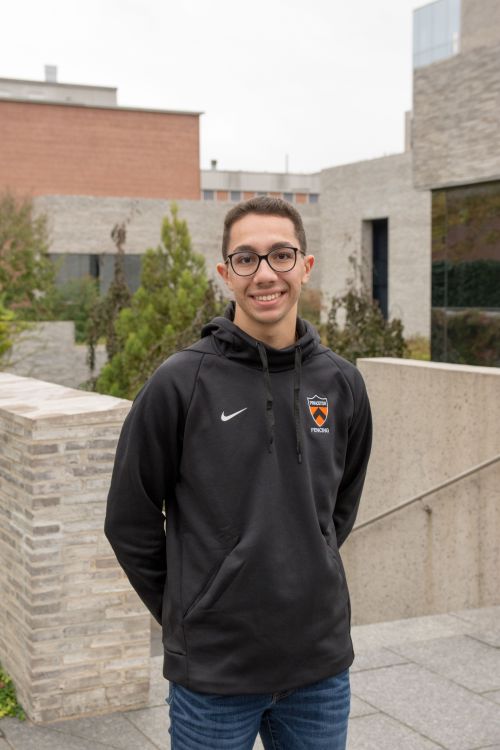
Mohamed Hamza’s training as a professional fencer prepared him for two of life’s greatest privileges and challenges. Representing his home country of Egypt in the Olympic Games. And being an undergraduate at Princeton studying Mechanical & Aerospace Engineering.
“There is a saying that fencing is like a physical game of chess. You are always trying to outplay your opponent while also being confident in your own actions. You have to be on your toes and make split-second decisions because the circumstances are constantly changing,” explains Mohamed, who is currently in his junior year. “There are so many different factors you have to take into account, and I like trying to figure out all those tactical nuances.”
Born into a family of fencers, Mohamed picked up his first foil when he was only six years old. With the support of his parents, who also doubled as
coaches, he continued to grow as an athlete throughout his youth. Mohamed was equally dedicated to his studies—showing an early aptitude and passion for math and science.
The lessons fencing taught Mohamed about how to think on his feet are skills he draws upon every day in engineering. He first became interested in the field during middle school.
“A lot of our tests focused on simply memorizing information. I liked that engineering was different—you were given a situation and had to apply everything you learned to find the answer. You were encouraged to be creative and problem solve,” he says.
In many ways, completing an engineering task was like winning a strategic fencing match. When Mohamed was not studying for advanced math and science classes, he would train for about four hours each day. In high school, he became one of the youngest fencers to qualify for the 2016 Rio Olympic team. After the 2018-2019 season he was the world’s #1 ranked Junior Fencer in Men’s Foil.
“That first year, in 2016, being one of the 36 athletes in the world to qualify for the Olympics was such a celebration. I felt so lucky that I was able to represent my country and represent them well,” describes Mohamed. “Fencing has always been a family activity. My sister also fences, and my parents played a huge role in how I motivated myself and progressed. It was incredible to share the journey with all of them.”
But as any world-class athlete knows, the road to greatness is often fraught with challenges. To prepare for the 2020 Tokyo Olympics, Mohamed originally decided to take a gap year from Princeton. However, the season ended up shutting down early due to the coronavirus pandemic. Mohamed decided to stay in Egypt to train and attend college virtually. But he soon became sick with COVID-19 and had to work harder than ever before just to regain his strength and stamina.
“At the time, it was very difficult. I had to stay focused with a lot of individual training and not lose track of my goals because we did not have any competitions that year. But when I look back now, I think it boosted my mentality when I got to the Olympics. A different level of drive and motivation came out in me that I never realized existed before,” he describes. When the results were in, Mohamed outperformed his world ranking of 22nd, with a 7th place finish in the Tokyo games.
The challenges Mohamed had to surmount on the fencing strip also sharpened his skills in the lab. With a year off from competition, he was able to intern at Alu Afric—an Egyptian engineering company. The experience inspired him to pursue a certificate in Material Science and Robotics.
“I enjoyed seeing the theories we learn about put into real-world applications. It was interesting to see all different types of engineers involved in the process and how they all relied on each other to produce the final product,” he says. “As engineers, we build and innovate as a team. If we fail, we fix it together and eventually we succeed.”
It is not unlike being an Olympic athlete. Looking back on his journey, Mohamed has countless fond memories. The seas of costumes from different countries at the opening ceremony. The photos he took with famous athletes in a variety of sports. The culture inside the Players’ Village, where Olympians would all casually wear their medals around the cafeteria.
Mohamed feels grateful for the opportunity to pursue both passions. After graduation, he plans to find a job in the industry while also working to qualify for the 2024 Paris and 2028 Los Angeles Olympic Games.
“For most other athletes, their job is fencing, and they typically train about 8 to 10 hours a day. But COVID helped me realize that too much fencing is not going to help me get better. I need a balance and I have to focus on my life beyond fencing,” he says. In the end, engineering was one of this Olympian’s best possible training tools.
-- Carolyn Sayre